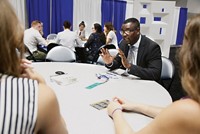Advertisement
Grab your lab coat. Let's get started
Welcome!
Welcome!
Create an account below to get 6 C&EN articles per month, receive newsletters and more - all free.
It seems this is your first time logging in online. Please enter the following information to continue.
As an ACS member you automatically get access to this site. All we need is few more details to create your reading experience.
Not you? Sign in with a different account.
Not you? Sign in with a different account.
ERROR 1
ERROR 1
ERROR 2
ERROR 2
ERROR 2
ERROR 2
ERROR 2
Password and Confirm password must match.
If you have an ACS member number, please enter it here so we can link this account to your membership. (optional)
ERROR 2
ACS values your privacy. By submitting your information, you are gaining access to C&EN and subscribing to our weekly newsletter. We use the information you provide to make your reading experience better, and we will never sell your data to third party members.
Careers
Get the Most Out of Career Fairs
C&EN offers tips on navigating the Chemjobs Career Fair in Boston
by Linda Wang
August 13, 2007
| A version of this story appeared in
Volume 85, Issue 33

IN 2005, during the ACS spring national meeting in San Diego, then-postdoc Aarti Joshi attended the Chemjobs Career Fair hoping to find a few leads.

With a Ph.D. in organic chemistry under her belt and butterflies in her stomach, Joshi interviewed with several companies that she had contacted prior to the meeting. She also took advantage of other career fair resources and made time to enjoy some of the meeting's technical talks.
Within a week of returning home, Joshi received e-mails from two companies she had interviewed with, inviting her for on-site interviews. After completing both interviews, she decided to accept a position with IRIX Pharmaceuticals. She is now a "principal scientist 1," responsible for process development and process evaluation of active pharmaceutical ingredients.
Joshi is happy with the outcome of her job search and notes that many of her friends also found jobs by attending the Chemjobs Career Fair. "I really feel the system works," Joshi says.
Next week, during the ACS fall national meeting in Boston, an estimated 2,000 job seekers are likely to endure, as did Joshi, waves of anxiety, anticipation, frustration, and joy as they navigate the fair in hopes of getting a foot in the door. The process can be overwhelming, says David Harwell, assistant director of the ACS Department of Career Management & Development, adding that many job seekers never realize all the resources available to them at the fair.
C&EN consulted the experts and the following are tips on how to get the most out of the experience.
1. Take advantage of the location.
How many companies decide to recruit at a national meeting can depend on where it is held. Few cities are as promising as Boston, measuring by the sheer number of life sciences and biotech companies based there. "In the Northeast, we typically have better responses by employers," says Karen Dyson, manager of career and employment services of the ACS Department of Career Management & Development. "There's just so much concentrated in that area."
Dyson expects Boston's career fair to draw as many employers as the 2006 fall national meeting's career fair in San Francisco, if not more. San Francisco's fair attracted 104 recruiting companies. In comparison, the Chicago meeting's fair in March drew 73 companies.
What's more, companies tend to hire more in the fall than they do in the spring. Academic job seekers will also have plenty of opportunities, with top-notch academic institutions just a few steps away.
2. Do your homework.
With 30 workshops to choose from, covering everything from negotiation techniques to starting a chemical consulting business, it pays to know what's happening when.
Dyson suggests going over the meeting's preliminary program (C&EN, June 25, page 61) and scheduling time for each of the workshops that might be helpful. She also suggests making time for the résumé reviews and mock interviews, which help prepare job seekers for the real thing. "They're in charge of their own career, but our job is to put them in the best position we can to get a job," Harwell says.
3. Sign up early/arrive early.
The résumé reviews and mock interviews require sign-up, and spaces generally fill up by the second day, Harwell says. He advises job seekers to sign up early. The workshops don't require sign-up, but several are known to fill up quickly. These include the mock interview demonstration workshop, the workshop for foreign-born chemical professionals on overcoming barriers, the Academic Employment Initiative (AEI) panel on getting your first academic position, and the workshop on effective interviewing techniques for chemical professionals.
4. Participate in the Academic Employment Initiative.
The career fair has traditionally been aimed at industry job seekers, but resources are now being expanded to academic job seekers as well. AEI, cosponsored by the ACS Office of Graduate Education, is a poster session held during Sci-Mix at which academic job seekers can talk with and present their research to recruiters.
There are also workshops for academic job seekers at the career fair. These include a new orientation session to help academic job seekers familiarize themselves with the AEI process and two new workshops titled "Effective Interviewing Techniques for Academic Positions" and "Writing Excellent Research Proposals."
5. Have a passion for something.
Joel Shulman, a former recruiter who retired from Procter & Gamble and is now an adjunct professor at the University of Cincinnati, says one of the questions he likes to ask is, "If I were to give you a million dollars to fund your research in any area you wanted to work in, doing any problem that you wanted to do for the next three years, what would you do?" He says that academic job seekers have thought about this question, whereas industry job seekers often have not.
"What that gets at is their technical curiosity, their motivation, how much of a self-starter they are," he says. "What you don't want are people who think that they're going into industry because industry is going to tell them what to do. You want somebody with some passion for chemistry."
6. Take advantage of technology.
In Boston this year, in addition to the mock interviews, the career fair is piloting virtual interviews that allow a job seeker to practice their skills with a virtual recruiter while the interview is recorded on video. Job seekers can then go back and review their interview.
"It's an opportunity for you to see what your mannerisms are," Harwell says. "It's kind of a low-stress way for you to just practice." In addition, several of the workshops will be videotaped and available for viewing on the Career Services website after the national meeting.
7. Update your résumé and interviewing skills.
Midcareer chemists looking to switch jobs can find resources specifically for them at the career fair. "It's important for them to attend some of these workshops, because the job market has changed," Harwell says. "There are a lot of new practices. It behooves you to go to one of these classes to learn about how people are interviewing and what the formats are for the résumés." Two workshops are targeted specifically to midcareer chemists: "Résumé Preparation for Experienced Chemical Professionals" and "Effective Interviewing Techniques for Chemical Professionals."
8. Take a practice run.
Attending the career fair for the first time can be daunting. Joshi says she didn't seriously consider job searching until the San Diego meeting, but took the opportunity the year before to see what's available at the career fair. She participated in the résumé review to polish hers and in a mock interviewing session to give her more confidence when speaking with recruiters. Joshi says the preparation made all the difference in the world in San Diego.
9. Set realistic expectations.
Job seekers face "a long process, sometimes involving several months," says Harwell. "They're probably not going to get the job here; they'll get the opportunity to have an interview."
10. Be persistent.
Joshi says that for several of the companies she interviewed with, she had to request an interview several times before the company agreed. Her persistence paid off because she got the job that she wanted. Joshi says that the next time she attends the career fair, she would like to be on the recruiting side.





Join the conversation
Contact the reporter
Submit a Letter to the Editor for publication
Engage with us on Twitter